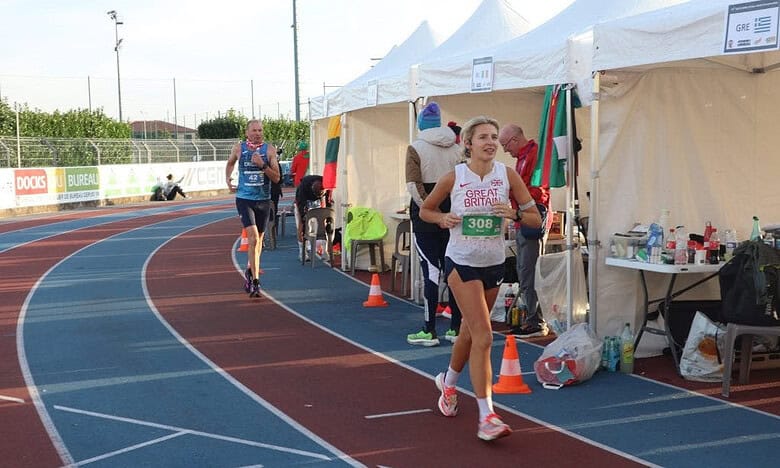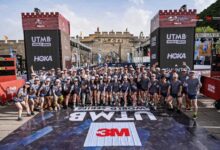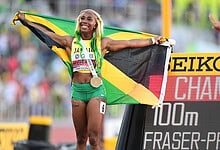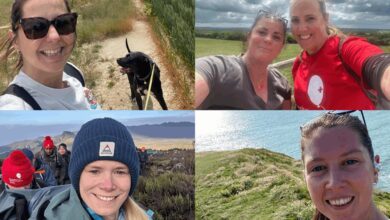
Superlatives like amazing, outstanding, and phenomenal are often used to describe sporting performances, and that can certainly be said about Sarah Webster’s taking down of the women’s World 24-Hour record last weekend at the IAU World 24-Hour Championships.
This was the 15th edition of the IAU World 24-Hour Championships. The Albi venue in South-West France is no stranger to hosting championships, having hosted the European 24-hour Championships in 2016 and the World 24-hour Championships in 2019.
It was also the fourth consecutive IAU World 24-Hour Championships where the women’s record was broken.
The fact that two other women also surpassed the previous record, on this occasion, just adds to the fact that the IAU World 24-Hour Championships continues to raise the bar and provide a stage for the best 24-Hour runners to excel.
Photo credit: John O’Regan
Women’s 24-hour Record Progression since 2010
255.303km Mami Kudo Japan 13.12.2009
256.246km Patryca Bereznowska. Poland 09.04.2017
259.991km Patryca Bereznowska Poland 02.07.2017
270.116km Camille Herron USA 27.10.2019
270.363km Miho Nakata Japan 02.12.2023
278.662km Sarah Webster GB 18.10. 2025
In numbers, Sarah ran a certified distance of 278.622km or 173.127 miles. An approximate average pace of 5 minutes 10 seconds per km or 8 minutes 20 seconds per mile, every mile.
In reality, all runners will have run a little further. The large field meant that runners did at times have to weave in and out of slower groups, meaning the shortest running line, along which the course was measured, certainly wasn’t followed.
To many runners, that pace is faster than their marathon pace. For faster marathon runners, it may appear slow at first sight, but the sheer intensity of running at that pace with very minimal breaks for a full 24 hours, as the world record status suggests, has never been done before.
To have three athletes in the same race all brave enough to go for and surpass an existing record, does not just happen by accident. A few key factors must align.

Photo credit: John O’Regan
A near-perfect training block, added to previous years of hard training and racing. Good conditions on the day, and if conditions aren’t perfect, then the ability to adapt on the day.
Dedicated crew, at one with your own goals and ready to support and think on their feet as the race progresses. The championship arena, where many excellent, well-prepared athletes come together and collectively create the atmosphere for excellence to happen.
Not to be underestimated in an IAU Championship is the team element, where you are also running with and for your fellow team runners. This can give an extra motivation, knowing your own performance is on the line.
Nakata, who came into the race as the existing record holder with a best of 270.116km, had been in this territory before. Ranson, with a PB of 263.548 from April 2025, had come close to it too, but Webster had come into the race, a little under the radar. Although she was the bronze medalist at the IAU World 100km Championships, in 2025, she had only made the step up to 24-Hours in London in April, recording 243.393km to gain selection for the championships. For her, it was somewhat of a journey of discovery into the unknown.
From the start, once things had settled down, Nakata led the race, with Ranson always in touching distance. Spain’s Perez-Serranno, Finland’s Noora Honkala and Ukraine’s Mariia Zahaiska all with excellent ultra CVslooked strong and comfortable in the first part of the race. Webster was noticeably off the pace around 10th for the first 100km, gradually she started moving through the field, not by speeding up as such but by just maintaining what she was doing. There was a spell in the middle of the night, possibly in the excitement of reaching podium paces and then taking the lead, when her pace increased slightly as others faded or were forced to take lengthy breaks. For Ranson, Nakata and Webster, there were no substantive breaks. A minute or two, here or there, to change a top, or a bathroom break, or a few seconds to stretch out tightening muscles, but otherwise, on the move the whole 24-Hours. The reality is you just can’t achieve 270km plus by allowing yourself the luxury of factoring in any breaks. That is the mindset you take into the race.

Photo credit: John O’Regan
As the race progressed, several competent runners like Honkala, Perez-Seranoa, and Zahaiska faded, Their bodies or minds just were unable on the day, to maintain the pace they had set out at, and hoped to hold.
Slowly, Webster was reaching some notable landmarks.
Jo Zakrzewski’s GB record of 247.964km was passed around the 21-hour mark. Patryca Bereznowska’s European record of 263.178km was passed just after 22 hours, and Miho Nakata’s world record of 270.363km, then became within touching distance. That was passed with just under an hour left, leaving Webster to push the record out even further in the remaining hour to finally reach that 277.622km. Ranson with 274.172km, and Nakata with 271.987km, were also inside the previous world record, but on this occasion having to settle for their respective National and Continental records.
In a world perspective, in a field of world-class male runners, only 4 ran further, and in a British perspective, amongst 24-hour runners, male or female, Webster ranks second. Only Matt Field, with his record of 281.303km set at Gloucester in 2024, has run further.
It is often said that 24-Hours is an event you must learn how to run. Fuelling correctly and pacing well are the key elements, but above all that, total belief in oneself and the inner determination to keep going when all regular body signals are telling you to stop, are often the key, whatever your standard to setting your PB and really pushing your own perceived barriers out or settling for competence.
The whole nature of a 24-Hour race is distance against time.
In a marathon or a 100km on the road or trails, the distance is fixed, and battling the clock is the goal. In a 24-hour period, the time is fixed, and the distance covered is the goal. Making it an open-ended target, of how far can you go, right up to when the clock turns from 23:59:59 to 24:00:00
From a British point of view, the women excelled. Kelsey Price had the race of her life. Her distance of 257.129km, also broke the British record by over 9km. That performance alone would usually make a star headline, but here, relegated almost to a cameo role, it was overshadowed by Webster.
Sophie Power ran a very solid race with 232.889, just below her PB, to close out an amazing team performance and seal the gold medals for the Novuna Great Britain and Northern Ireland team.

Photo credit: John O’Regan
Ally Young and the previous GB record holder, Jo Zakrzewski, although having challenging races, battled to the end, knowing a mis-step from any of our three scoring runners would make their distance crucial to any team success.
NOTE: In IAU team competitions, the distances of the first three runners in a team are added together to produce the team score.
The British men fared less well. All of them had issues during the race. Chris Kelley was the leading man for the GB &NI team with a respectable 249.618km (155.105 miles) for 30th place. However, the men’s team finished well down in 15th place, well below expectations.
It should be remembered that unlike the global trail scene, there are few professional runners, specialising at the 24-hour event. The vast majority are just doing what they love and for the moment at least, although well-funded by UKA in the past, due to recent financial issues, most British off-track teams are all self-funding themselves to global championships.
The Men’s Race
Although the women stole the show, for the men, Andrii Tkachuk, ran one of the top-10 best distances by a male athlete, of 294.346km /182.898 miles.
When early leader Pascal Rueger dropped after around 100km, the Ukrainian found himself in the lead and was never really challenged, running strongly through the night hours and building a substantial lead. Over the final 12 hours, unlike the women’s race, the minor podium places fluctuated. Fotios Sisimopoulous of Greece, Tamas Bodis of Hungary, France’s Gabriel Noutary, and Lithuania’s Andreas Priebus were all on or close to the podium. It was the Scandinavian duo of Jo Inge Norum of Norway, and Matti Jonka of Finland who surged through in the last six hours to record national records of 285.513kmkm, and 283.699kmkm respectively. Finland’s first medal in an IAU Global Championships. Jonka gained a second medal in leading the Finns to the men’s team title as well.
Behind them, a string of other national records by men and women were set, and it truly was a race for the ages that will be looked back on as a defining moment in 24-hour running.
The event had a record total of 397 entries. 222 men and 175 women were on the start lists from a record 47 Federations. An increase from 2019, the last time the event was held in Albi, when 346 runners took part (200 men and 146 Women.)
All in all, it was a ground-breaking championship with 9 female runners topping 240km and 18 Men going beyond 260km.
However, pride of place must go to the three leading women, who had come into the race with the belief that, on a perfect day, they could better the existing world record. The reality is that they all did, but it was Webster who, on the day, secured the best distance.
Listen to our podcast with Sarah Webster on Substack, Apple and Spotify.

Overall Results Men
- Andrii Tkachuk UKR 294.346km
- Jo Inge Norum NOR 285.513km
- Matti Jonkka FIN 283.699km
- Tamas Bodas HUN 279.780km
- Emil Krog Ingerslev DEN 278.132km
- Andrzej. Piotrowski POL 274.313km
Overall results Women
- Sarah Webster GBR 278.622km
- Holly Ranson AUS 274.172km
- Miho Nakata JPN 271.987km
- Kelsey Price GBR 257.129km
- Patryca Bereznewska POL 251.371km
- Maria Perez Serrano ESP 249.48km
Team Results Women
1. Great Britain & NI 766.641km
2. Australia 744.601km
3. Japan 726.641km
British Results Women
1. Sarah Webster, Lewes 278.622km
4. Kelsey Price, Run Head AC 257.129km
18. Sophie Power, Guilford & Godalming 232.889km
30. Jo Zakrzewski, Durham 222.529km
45. Ali Young, Chiltern Runners 213.385km
157. Jen Coleman, Les Croupiers 81.017km
British Results Men
30. Chris Kelly, Vegan Runners 249.618km
50. Robbie Britton, Norfolk Beach Runners 232.939km
64. Paul Maskell, St Austell Running Club 222.612km
94. Dan Lawson, Trail Running Association 204.433km
71. Ben Wernick, Ogmore Wolves 141.030km
202. Matt Field, Bad Boy Running Club 28.506km














